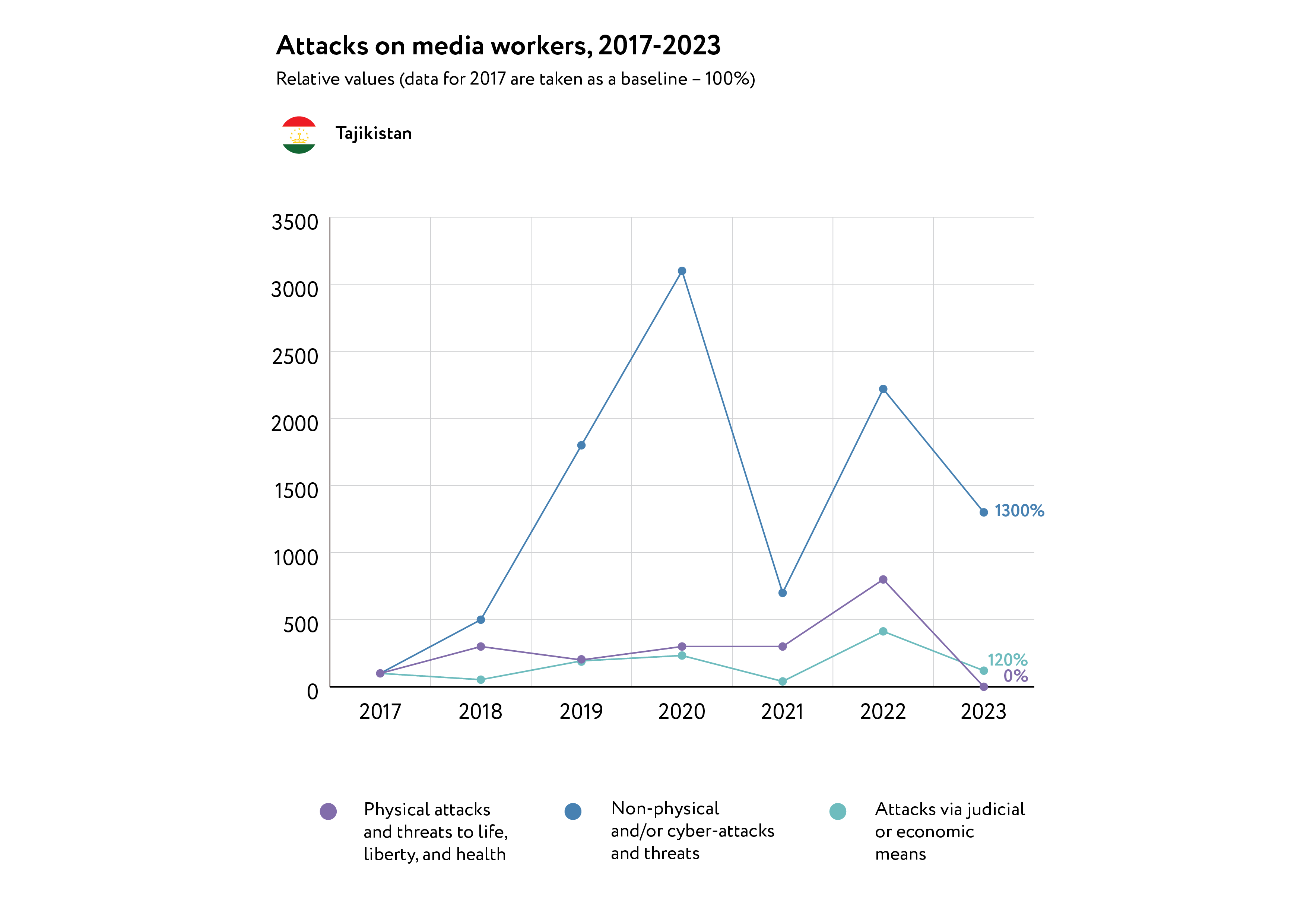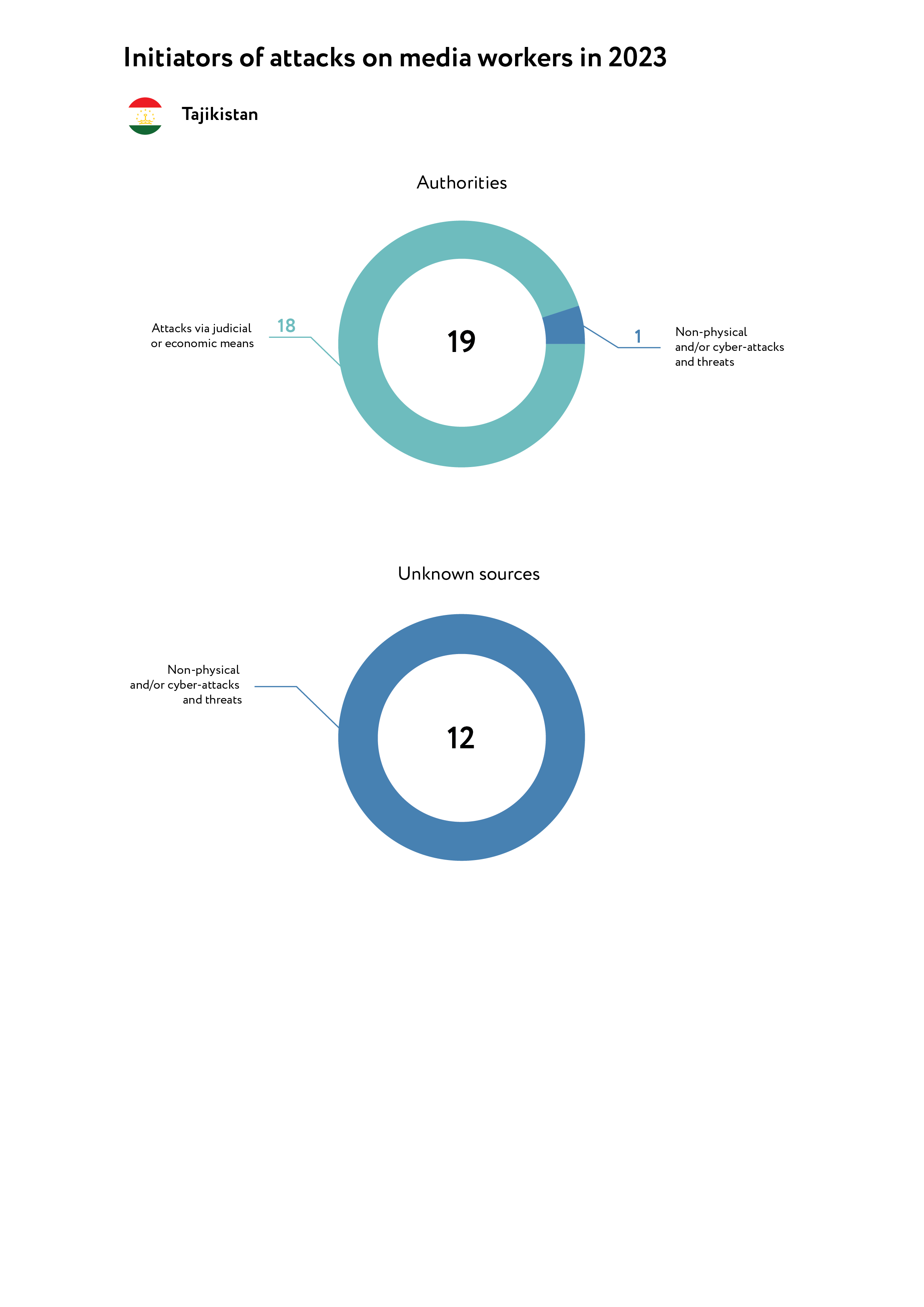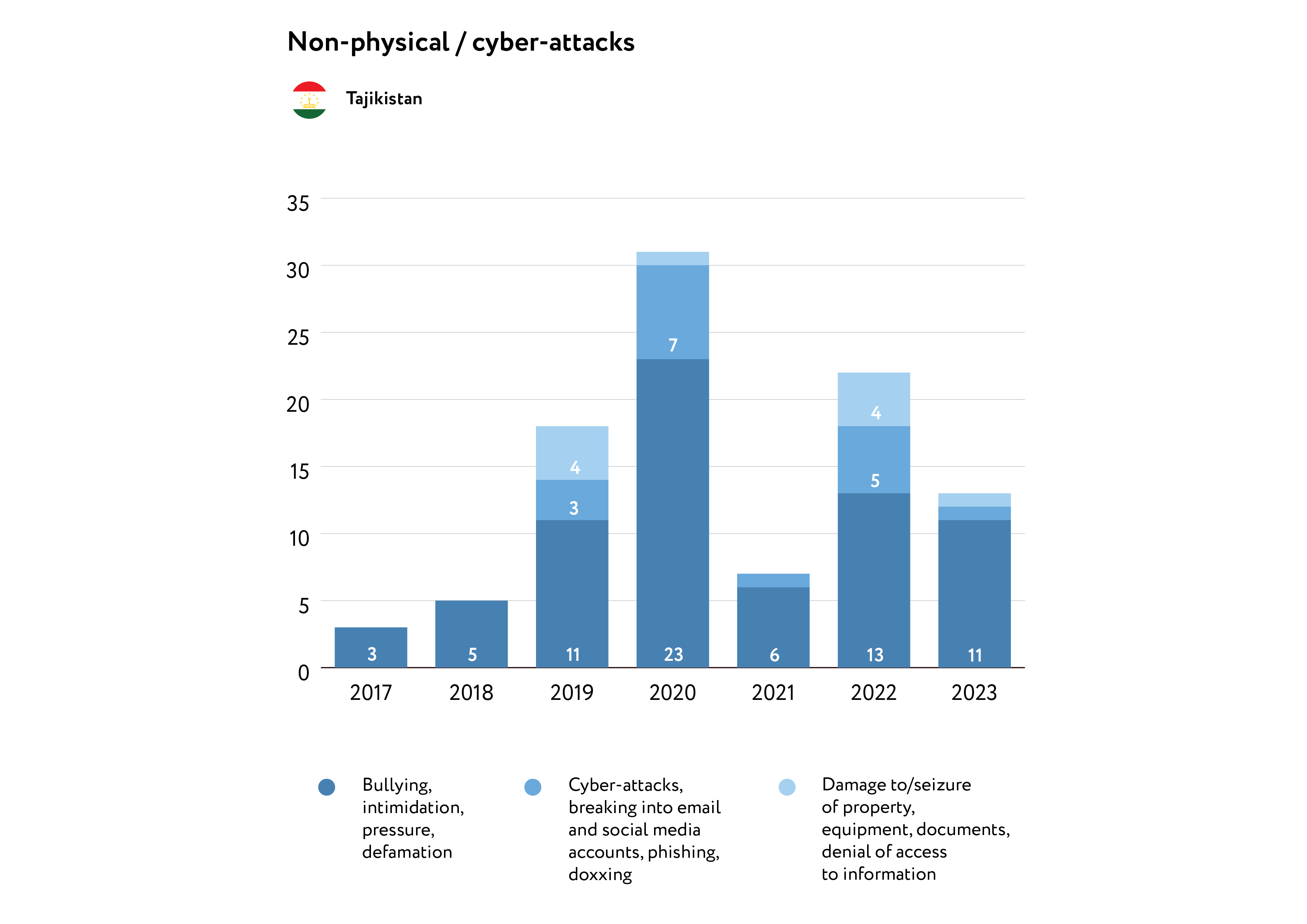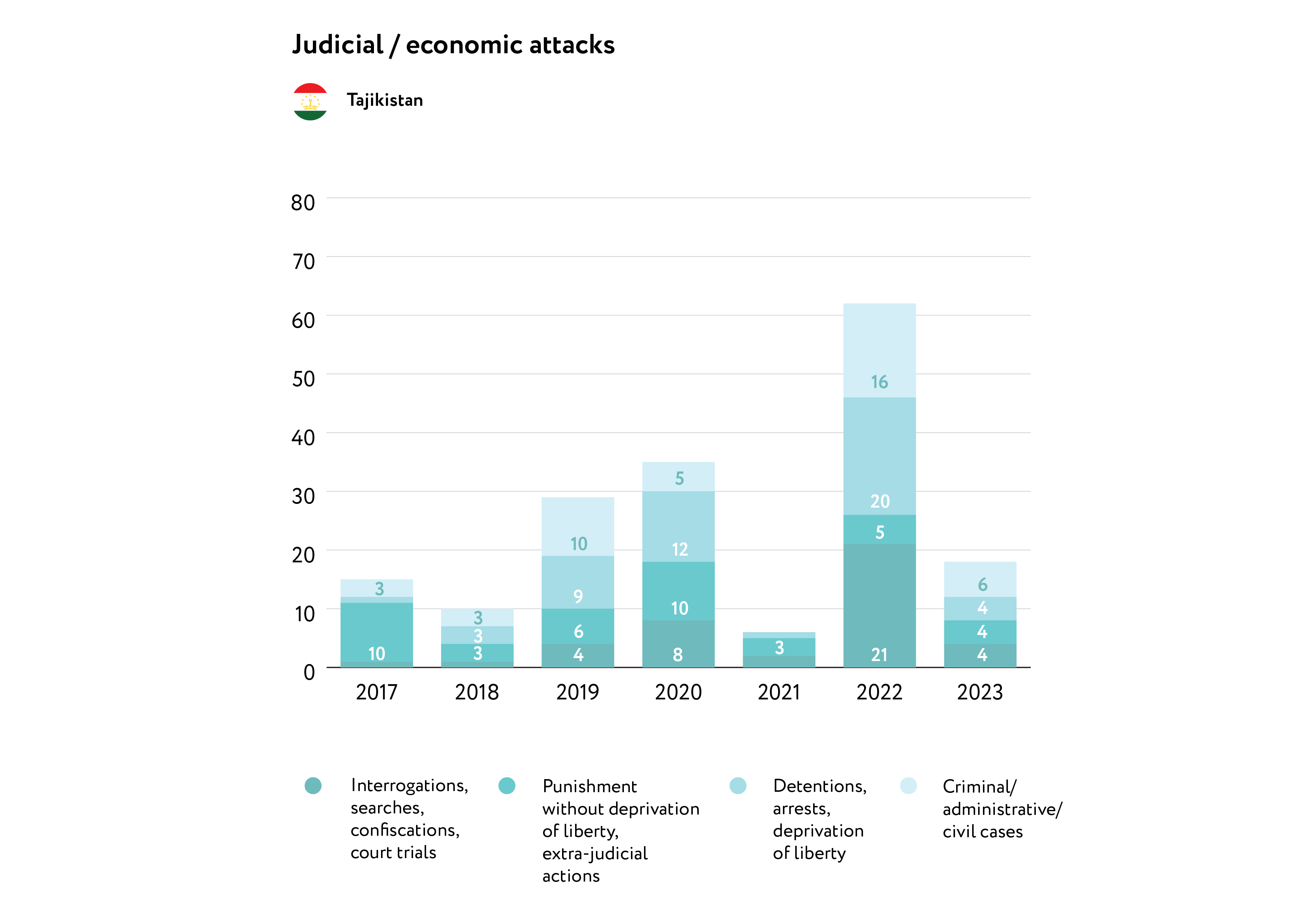PHOTO: Khurshed Fozilov (personal archive)
1/ KEY FINDINGS
In Tajikistan, 31 cases of attacks/threats against professional and civilian media workers and editorial offices of traditional and online publications were identified and analysed in the course of the research for 2023. Data for the study were collected using open-source content analysis in Russian, Tajik and English. This report also includes unpublished data obtained via expert interviews. It is worth noting that the data is impacted by the fact that many attacks on media representatives are not made public or reported by the victims. This is often due to the threat of further attacks and persecution. A list of the main sources is provided in Annex 1.
- In comparison to 2022, there was a threefold decrease in the number of attacks on journalists and media workers in Tajikistan, from 92 to 31 cases.
- In 2023, there were no reported cases of physical attacks against media workers. However, in 2022, there were at least eight documented cases.
- 58% of these incidents were attacks via judicial and/or economic means. The remaining 13 were attacks of a non-physical nature.
- 61% of attacks were committed by government officials. The authorities exclusively used judicial means of attack, including pressuring the relatives of journalists and media workers.
- A new trend emerged in Tajikistan in 2023: Seven Tajik publications, three of which are state-owned, received threats to work email addresses from a group of Russian hackers called “CyberHooligans.” The hackers threatened to launch cyber-attacks on Tajik publications in retaliation for crimes committed by Tajik citizens based in Russia.
2/ THE POLITICAL SITUATION AND THE MEDIA IN TAJIKISTAN
In Reporters Without Borders’ press freedom index for 2023, Tajikistan ranked 153rd, down one point from 2022. A year earlier, Tajikistan fell by 10 points when it recorded the highest number of attacks on journalists and media workers in six years. Tajikistan ranked between Afghanistan and Kuwait in the index.
For the past two years, Reporters Without Borders has used a new methodology to compile these rankings, which takes into account five additional factors impacting press freedom: namely, the political, economic, and sociocultural context, legal framework and security situation. The report indicates that authorities’ repressive actions are intensifying. Journalists are increasingly emigrating, and those who choose to stay are resorting to self-censorship.
There were no major political events in Tajikistan in 2023. However, the year was strongly reminiscent of 2022, which saw a significant and unprecedented increase in attacks on human rights defenders and media workers.
A decline in interest in global events, including the war in Ukraine, was noted in both Tajikistan’s media and society as a whole. Independent media have become less likely to address these topics due to increasing self-censorship. There were increased amounts of Russian propaganda featured in independent publications and on social media, where bloggers openly promoted the Russian agenda.
All attempts by independent publications to assess the events that took place in Tajikistan in the spring of 2022 – the suppression of protests in the Gorno-Badakhshan region (GBAO), which resulted in the death of 34 civilians – were stifled by the authorities. Only journalists living outside of Tajikistan published on this topic. The authorities, in turn, continue to target the families of these journalists. For example, the Ministry of Internal Affairs contacted the mother of Prague-based journalist Anora Sarkorova and informed her that a criminal case had been brought against her son-in-law, journalist Rustam Joni.
Rustam Joni and Anora Sarkorova are essentially the only Tajik independent journalists attempting to cover the GBAO situation, especially after the mass arrests of journalists and human rights activists that followed the violent suppression of the protests.
Following the mass arrests of journalists in the country in 2022, the Committee to Protect Journalists included Tajikistan among the 12 countries it considers to be “prisons for journalists”. The report states that “Tajikistan continues to be the top jailer of journalists in Central Asia, with seven journalists serving prison sentences of between seven and 20 years – all of them convicted since late 2022”. It should be noted that prior to 2022, media workers were rarely jailed.
3/ GENERAL ANALYSIS OF ATTACKS
After the unprecedented attacks on journalists in 2022, 2023 was seen as a “year of silence” for journalists and media workers. Of the 31 incidents, 19 were perpetrated by government officials, and unknown individuals committed the remaining attacks.

This fourfold reduction in the number of attacks is due in part to the fact that journalists do not want to expose themselves to danger, and the authorities constantly remind media workers that they could end up in prison. In 2023, two arrests of media workers were recorded.
No physical attacks were recorded. However, the trial of journalist Khurshed Fozilov took place behind closed doors in a temporary detention centre. Neither relatives nor colleagues were permitted to attend the defence hearings.

It should be noted that these figures do not necessarily tell the full story of what is happening to media workers in Tajikistan. Journalists often prefer not to report such attacks because, based on previous experience, the perpetrators will not be punished. In addition, media workers are used to receiving threats and consider them to be part of the job.
4/ PHYSICAL ATTACKS AND THREATS TO LIFE, LIBERTY AND HEALTH
Not a single physical attack had been recorded in 2023, unlike in 2022, when there were a record eight incidents. However, on the night of 12 August 2022, Tajik TV and radio presenter and general director of the Avtoradio Tajikistan radio station Faridun Khairullozoda died in Dushanbe. He was 27 years old. His colleagues and friends said that he had taken his own life. The results of his case review were not disclosed in 2022 or 2023.
5/ NON-PHYSICAL AND/OR CYBER-ATTACKS AND THREATS
Thirteen attacks of this category were recorded in Tajikistan in 2023. Journalists and media workers do not regularly publicise these cases, and often do not attach a great deal of significance to them. They are considered a mere nuisance when compared with other types of attacks. As a result, there is practically no mention of these attacks by official sources.

There was only one case of a non-physical attack being perpetrated by a government official. All other cases, including threats via email, came from unknown individuals.
- On 14 April, Nurangez Rustamzoda was attempting to report from the central mosque in Dushanbe. Despite having all the necessary permits, three police officers forced her to leave, threatening her with a two-week jail term. The police officers also tried to confiscate her camera equipment.
The main method of non-physical pressure, as was the case in previous years, was the bullying, intimidation and slandering of media workers:
- For three months, videos broadcasting insults and accusations against the editor-in-chief of Isloh.net, Muhammadikboli Sadriddin, were uploaded to YouTube. In these videos, unknown individuals can be seen reading scripted texts.
- On 11 March, relatives of the detained (and later convicted) journalist Khurshed Fozilov expressed concern about the social media campaign to discredit him. They claim that it started with a Facebook post by the Facebook user Sharaf Karimov, in which he calls the journalist “uneducated” and states that Fozilov “chose the wrong path” and “was deceiving the people”.
- On 10 April, independent journalist Abdukodir Talbakov reported an increase in threats and harassment against him after he posted on social media about his commitment to Zoroastrianism. Since February, his statements about the need to revive and officially register the Zoroastrian society of Tajikistan in the country have led to heated discussions between Tajik citizens on social media. A number of threats were made against Talbakov, who was criticised for “hurting the religious feelings of Muslims”.
- On 6 June, a video about the personal life of blogger Jonona Ashurova was anonymously posted and distributed online. She faced harassment as a result of this action.
Seven Tajik publications also received threats from an anonymous group of people, who identified themselves as part of the Russian hacking group “CyberHooligans”.
- On 30 and 31 December, Tajikistan-based Independent publications Asia-Plus, Vecherka, Avesta and Your.tj, as well as the state-owned newspaper Sadoi Mardum, TV Tojikiston and the state news agency Khovar, received threats online in connection with offences committed by citizens of Tajikistan in Russia.An anonymous group demanded that citizens of Tajikistan stop entering Russia and committing crimes.
6/ ATTACKS VIA JUDICIAL AND/OR ECONOMIC MEANS
In 2023, 18 attacks via judicial means were recorded, compared to 62 attacks the year before. Despite this decrease, the methods of pressure remain the same: authorities calling in relatives for interrogation, detentions and trials, blocking and banning publications within Tajikistan.

There were at least three documented incidents involving authorities exerting pressure on the families of journalists in exile:
- According to the Facebook page, on 23 March, the mother of Prague-based journalist Anora Sarkorova was summoned by the Ministry of Internal Affairs for the Sino district of Dushanbe. She was informed that a criminal case had been brought against her son-in-law, journalist Rustami Joni. According to Sarkorova, the investigator recorded their personal information and places of residence, as well as the personal information of their deceased father and her two young children.
- On 1 October, Russia expelled 36-year-old Tajik citizen Asliddin Sharifov, the brother of Shavkat Muhammadi, director of the opposition media outlet Payem TV, which the Islamic Renaissance Party founded. This organisation is banned in Tajikistan and Russia but is active abroad. Asliddin Sharifov spent more than a year in a pre-trial detention centre in Nizhny Tagil, Russia, following a request from authorities in Tajikistan, who accused him of collaborating with a banned organisation. According to the Sverdlovsk regional prosecutor’s office’s conclusion, Sharifov is suspected of collaborating with banned organisations and their propaganda through the media and online In Tajikistan. This crime (Part 2 of Article 307 [3] of the Criminal Code) is punishable by five to eight years in prison. Only on 18 November, Sharifov’s relatives discovered he was being held in a temporary detention centre in Khujand. His brother told Radio Ozodithat Asliddin is being made to suffer as a result of his activities, and that the charges against him are politically motivated.
For the first time in several years, the Tajik authorities requested that a journalist be extradited from a European country in 2023.
- On 12 June, it was discovered that Tajikistan had requested that France extradite opposition figure and editor-in-chief of Islokh, Muhammadikboli Sadriddin, who was accused in his homeland of large-scale fraud. On 15 October 2020, the Prosecutor General’s Office of Tajikistan reported that a criminal case had been brought against Saduridinov Muhammadikbol (Muhammadikboli Sadriddin) in accordance with Article 247, Part 4 of the Criminal Code (“fraud on an especially large scale”) and he was placed on the wanted list. This request was sent by the Ministry of Foreign Affairs of Tajikistan, on the basis of a ruling by the Ismoili Somoni district court in Dushanbe.
In 2023, a Supreme Court decision officially recognised two online publications as extremist in Tajikistan:
- On 14 July, the court labelled the publication Pamir Daily News “extremist”. The website is blocked in Tajikistan, and anyone who collaborates with the publication may be subject to criminal liability.
- On 21 July, the Supreme Court of Tajikistan upheld the Prosecutor General’s claim and recognised the New Tajikistan 2 website as an extremist organisation, banning it in the country. The Prosecutor General’s Office of Tajikistan warned of criminal liability for anyone collaborating engaging with a banned site. Collaborating with an organisation labelled as “extremist” by the court, according to the Criminal Code of the Republic of Tajikistan, is punishable by between five to eight years in prison.
At least one independent journalist was sentenced to a lengthy prison term. Another blogger was sentenced to five days of administrative arrest:
- On 26 May, following a decision from the Penjikent City Court, Tajik journalist Khurshed Fozilov was sentenced to 7 years in prison. His trial took place in the Khujand temporary detention centre, behind closed doors and without the presence of his relatives. Fozilov, who wrote news reports and articles covering the Zarafshan region, was detained on 6 March and later taken to a temporary detention centre in Khujand. Authorities accused him of collaborating with groups and movements banned in Tajikistan. Fozilov, via his lawyer, stated that he was forced to testify against himself and that he had never collaborated with any banned organisations.
- On 17 January, the Dushanbe Department of Internal Affairs announced the detention of blogger Khabibullo Khimmatzoda, for “distributing offensive videos with insults and obscene language on Instagram”. The court sentenced the blogger to five days of administrative arrest.
The pressure on human rights defenders continued in 2023. At least one public organisation providing legal assistance to journalists and media workers was forced to shut down as a result of this pressure.
- Following a recommendation from the Ministry of Justice in Tajikistan, the human rights organisation The Independent Centre for the Protection of Human Rights was shut down on 26 January. For the last 13 years, the non-governmental organisation (NGO) has been involved in the fight against torture in Tajikistan, as well as the protection of journalists’ rights. Deputy Minister of Justice Asadullo Khakimzoda told reporters: “The activities of the NGO were terminated due to untimely submission of financial statements and other violations.” Lawyers from the NGO represented the interests of detained journalists in court.
ANNEX 1: OPEN SOURCES USED FOR GATHERING DATA (TAJIKISTAN)
- Asia-Plus – an independent news agency of Tajikistan.
- Eurasianet – an independent news organization that covers news from and about the South Caucasus and Central Asia, providing on-the-ground reporting and critical perspectives on the most important developments in the region.
- Fergana News Agency – a resource covering events in Central Asia.
- Radio Ozodi – the Tajik service of Radio Liberty.
- Reporters Without Borders – an international non-profit, non-governmental organisation that conducts political advocacy on issues relating to freedom of information and freedom of the press.
- Committee to Protect Journalists (CPJ) – an international non-governmental organisation that defends the rights of journalists.
- Other open-source media in the Tajik, Russian, and English languages are accessible on the internet network, as well as social networks.
